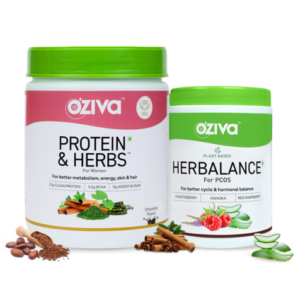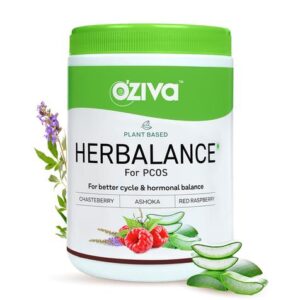PCOS symptoms need more attention than you think. It is manageable, but you need to be cautious.
Did your doctor diagnose you with PCOS?
Are you wondering what it is and how to deal with PCOS symptoms?
Well, here is everything you need to know about PCOS signs & symptoms.
Polycystic Ovary Syndrome (PCOS) is a condition due to hormonal imbalances, especially excess production of androgens (male hormones). It is widespread in women who fall under childbearing age. Thus, PCOS disease symptoms can be easily diagnosed.
According to a study conducted by the PCOS Society, one amongst ten Indian women has PCOS. The lack of a healthy lifestyle is the most significant cause of PCOS in women nowadays. If affected, PCOS symptoms in females can be of various types.
Let us understand the PCOS signs and symptoms you should observe.
Polycystic Ovary Syndrome Symptoms
A study cites that almost 70% of women are unaware that they have PCOS until diagnosed. Here is a list of Polycystic Ovary Syndrome Symptoms that a woman should not ignore. Scientifically speaking, PCOS is a hormonal disorder affecting over 10 million women every year in the world. David A. Ehrmann, MD, director of the University of Chicago Centre for PCOS in Illinois refers to this syndrome as reproductive metabolism syndrome – as reproductive abnormalities are the major reason for it.
A woman showing PCOS symptoms deals with acne, stray hairs, weight gain, period problems, and other symptoms. Hence, learning about how to effectively deal with these issues is crucial. If PCOS symptoms aren’t detected and treated in time, it may have long-term consequences and cause pain throughout your life. And so, opting for the right diagnosis for existing satisfaction, long-term health, and forthcoming plans to have a family is much needed. The first step, however, is to have a piece of good knowledge about PCOS symptoms.
Irregular menstrual cycle
A regular menstrual cycle indicates normal ovulation, where your ovaries release the eggs. These eggs are then eliminated through menstruation when they remain unfertilized. But if you have PCOS symptoms, your body is going through a process known as anovulation, i.e., the non-release of eggs. It thus leads to irregular menses.
A heavy flow of blood during the menstrual cycle
The uterine lining is not shed regularly due to a lack of ovulation and builds up into a thick consistency. Consequently, you experience heavy bleeding during periods as the body eliminates all the built-up uterine lining. This is another majorPCOS symptom
Excessive hair on the body
Are you experiencing excess growth of hair on your body? Then you may be experiencing one of the PCOS symptoms, i.e., hirsutism.
Obesity
Research suggests that there is a close link between obesity and PCOS. It can lead to:
- Increasing blood pressure level
- Increasing blood sugar level
- Decreased HDL
- Increased LDL
Acne
Androgens cause secretion of excessive oil/sebum from the skin. So if you have frequent acne breakouts, you are having one of the PCOS symptoms.
Headache
PCOS symptoms also include severe headaches, as cited by some women.
Skin Darkening
Women experiencing PCOS symptoms can experience dark patches around the nose, chin, and under the breast.
How to manage PCOS?
PCOS is not a life-threatening disease. However, it can be very dangerous after a certain level. As aforesaid, it is a sort of hormonal disorder that affects females as they start to produce male hormones in higher amounts. It can be cured if catered to well and caught sight of within time. Management of PCOS signs and symptoms revolves around our lifestyle. Here are some tips to manage PCOS symptoms.
Suggested read – 4 Workouts for PCOS
Exercise
Regular workouts can help reduce weight and also manage PCOS signs and symptoms. According to some research, 30 minutes of exercise thrice a week can help regulate the menstrual cycle and correct insulin and cholesterol levels and control PCOS symptoms
Suggested read – 5 Vitamins & Minerals to Add to Your PCOS Diet
Diet
Diet is perhaps the most crucial part of managing PCOS signs and symptoms. According to studies, to help lower the PCOS symptoms, reduce your carbohydrate intake. Include fruits, vegetables, and grains in the diet.
Dietary Supplements
Sometimes, what you eat may not be enough to meet your body’s nutrient requirements. In such cases, it is advisable to consume dietary supplements to manage PCOS symptoms. Opt for additive and preservative-free supplements like those from OZiva. The OZiva Plant Based HerBalance for PCOS is an ayurvedic supplement free of gluten, soy, and sugars. Excess insulin production is one of the major PCOS symptoms – as it stimulates more production of male hormones, which may result in infertility. To avoid the consequences and managing PCOS signs and symptoms, Oziva Herbalance for PCOS can be consumed. It contains 50 mcg of Chromium per serving and 500 mg of Vitamin B8 (Inositol) that may help improve the fertility rate.
Suggested read – How Can I Treat PCOS with Lifestyle Changes?
Final Words
We live in an era where a healthy lifestyle has taken a back seat. It is time to turn the tables by adding the right vitamins, minerals, and proteins to our bodies. It is only then we can manage lifestyle disorders like PCOS and control PCOS disease symptoms. PCOS, being a very common and widely known syndrome affecting women all around the world, hinders a woman’s menstrual cycle and makes it complicated for them to conceive. The formation of androgens in high quantities causes various problems, as mentioned earlier. Due to these changes, women start to feel insecure. Thus, it leads to numerous mental illnesses. Consequently, it’s now extremely important to recognize the disorders in time – and opt for medical treatment. There are some products one may also opt for before undergoing medical treatment, such as the Oziva plant-based HerBalance for PCOS, which is a natural PCOS cure or treatment for the PCOS symptoms. However, it is always advisable for every PCOS sufferer to consult a doctor before any home remedies dealing with PCOS signs and symptoms.
Visit the OZiva blog for more informative articles like this one.
Last modified: September 5, 2023






